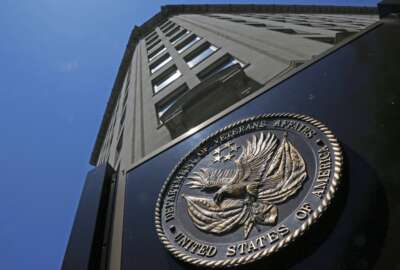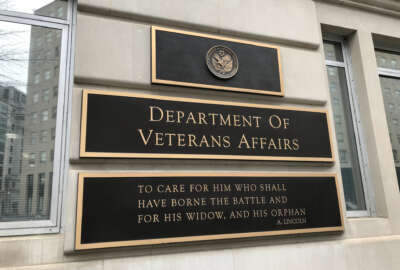Trump’s VA pick defends hiring freeze amid staffing concerns
Trump's VA pick, former Rep. Doug Collins, said the VA may be trying to fill positions, but many of those vacancies have gone unfilled for weeks or longer.
President Donald Trump’s pick to run the Department of Veterans Affairs says his plan to remove poor-performing VA employees would boost morale for the rest of the workforce.
Former Rep. Doug Collins (R-Ga.), an Iraq War veteran and Air Force Reserve chaplain, told members of the Senate VA Committee that he also supports expanding veterans’ options for health care outside the VA.
“VA will not have a stronger fighter for the employees and the workforce than this secretary, if confirmed — and also one that will make sure that we’re held accountable, because good work begets good work, and others need to be held accountable,” Collins said Tuesday.
Members of the Senate VA Committee, however, raised concerns about a governmentwide hiring freeze impacting the VA’s health care mission and whether the Trump administration would pursue cuts to its workforce.
“There will be potentially heavy pressures on you to cut and slash, to reduce access and eligibility, because the VA, frankly, is a target-rich environment for cost-cutters, and we know that there is a Department of Government Efficiency looking for those kinds of cost-cutting opportunities,” Ranking Member Richard Blumenthal (D-Conn.) told Collins.
Scope of VA hiring freeze unclear
Trump signed an executive order Monday declaring a 90-day hiring freeze across the federal government. The executive order includes several exemptions, including one for veterans’ benefits.
The VA made its health care workforce exempt from the first Trump administration’s hiring freeze in 2017. But Collins didn’t make an explicit assurance to lawmakers the department would grant those same carveouts this time around.
“President Trump, in this executive order, is to get an assessment on where we are with our employees. It is not to take away from anything that is currently there,” Collins said. “We may not, at this point, bring in a new person tomorrow, unless needed, but this is where we’re at.”
Blumenthal pressed Collins, if confirmed, to issue guidance allowing the VA to keep staffing up its medical center and its crisis hotline during the freeze.
“This is going to be a first test of your leadership, whether you fight for an exemption in the hiring freeze for the non-veterans benefits employees who are needed to care for veterans at medical facilities and other places, including the Veterans Crisis Line,” Blumenthal said.
Collins said the VA may be trying to fill positions, but many of those vacancies have gone unfilled for weeks or longer.
“No one on the veteran health care side is going to miss their health care provider because of this new hiring freeze. The president is doing a prudent step as he comes into office to make sure that we have a good handle on what we’ve got,” Collins said.
Sen. Angus King (I-Maine) warned a hiring freeze shouldn’t prevent a VA hospital from hiring a cardiologist, if staff there have spent months trying to hire one. King also raised concerns with the VA automating parts of the claims review process, adding it “will be very tempting to reduce staff and replace it with this technology.”
“In many cases, staff cuts equal benefit cuts, because if there’s nobody there to answer the phone, or if the process is delayed to the point where the veteran dies or just gives up, that’s in effect, a benefit cut,” King said.
Collins said he’s open to continuing to find opportunities to use automation and AI to streamline the processing of veterans’ benefits claims, adding that “there will always be a person there to oversee that process.”
“I’m willing to look at any opportunity to get their veterans benefits quicker. And if that involves AI, then I’m not willing to take it off the payroll,” Collins said.
VA poor-performers ‘not going to have a job anymore’
Collins told the committee he’d guarantee the VA uses every tool available to remove poor-performing employees. He said the 2017 VA Accountability and Whistleblower Protection Act, which he voted for in the House, ensures “those workers who were not fulfilling their mission, they were not going to have a job anymore.”
The VA, under the first Trump administration, fired thousands of employees through an expedited removal process created under that law. However, federal judges and the Merit Systems Protection Board repeatedly blocked many of the legislation’s provisions from covering most VA employees.
Under the Biden administration, a top VA human resources issued a March 2023 memo stating that the department would not propose new adverse actions against VA employees using the 2017 law.
“If there is someone who is harming or in the way of our veterans and taking a veteran’s benefit away, I have no problem in getting rid of that person and making sure we do it properly. And I have no problem with the legal repercussion of that, because there’s no one at the VA that’s going to stand in the way of a veteran getting the care properly, and if they’re not doing it safely,” Collins said.
Committee Chairman Jerry Moran (R-Kan.) said VA employees disciplined for a long list of “errors and mistakes” are too often reassigned or relocated, rather than fired.
“The response, ultimately, if you ever hear about what happened to that person, that employee, is we transferred them to another hospital,” Moran said.
The department reinstated 120 employees — about 3% of the 4,000 employees fired under the widely challenged law paid about $134 million to other former employees the VA fired. The VA agreed to these actions, as part of a settlement it reached with the American Federation of Government Employees in July 2023. No employee fired for grievous misconduct has been rehired.
“Failing up is not an option. You don’t fail up. What we will do is I’ll work within any employee agreements, collective bargaining. But you’re putting a veteran’s health and safety at harm, I will make sure the department will get rid of you, and we’re willing to do whatever it takes to do that,” Collins said. “We’ll do everything within the agreements to make sure their process is followed, but I will not tolerate it.”
Collins said these accountability measures would also boost the morale of VA employees who are doing their jobs.
“If I want to retain doctors, if I want to retain nurses, if we want to retain benefits people, then you’ve got to set a standard that says, ‘I’m proud to be here,'” he said. “I want to lead an agency that works and puts our veterans first and holds accountable those that have not.”
Collins said he would also hold the VA workforce accountable to Trump’s demand that teleworking employees return to the office full-time. The Veterans Benefits Administration, as of last July, allowed its employees in the D.C. metro area to telework up to five days per two-week pay period.
“I do believe people need to come to work. The president’s made that very clear that people need to come to work. We have a large portion of the VA workforce is unionized, and they’re in contracts, but we’re going to work together to get people back to work,” he said.
About 80% of the VA’s workforce belongs to a union.
Community care to grow, VA to remain ‘backup’
Collins told senators he supports expanding veterans’ access to “community care” in non-VA medical facilities. He voted for the 2018 MISSION Act, which expanded veterans’ access to non-VA health care options if they lived far away from the nearest VA medical facility.
Collins said the VA under his leadership would continue to expand veterans’ access to “community care” from non-VA health care providers, but vowed the VA’s own network of medical facilities would remain a “backup” option.
“At the end of the day, the veteran is getting taken care of. VA care is going to happen. VA care will be there. There will always be the VA health care system for the veteran,” Collins said.
“We don’t do the same things 40 years ago that we can still do today. If we’re wanting to stay current with what’s going on, and our newer veterans deserve every access to finding care where they can,” Collins said.
Sen. Bernie Sanders (I-Vt.), however, said shifting more VA dollars to pay for community care would divert funding away from direct investment in the department’s health care facilities and staff.
VA’s spending on community ballooned from $8 billion in 2014 to $31 billion in 2024.
“Ideally, what we could say is, ‘Hey, you’re a veteran, you want to go into private care? No problem. You want to go to the VA? No problem.’ Have a strong VA, strong private care. You don’t have enough money to do that. So, in fact, what the debate comes down to is whether somebody should be able to access community care, but where are we going to put our resources? Are we going to allow the VA to wither on the vine, so to speak?” Sanders said.
Collins, however, said the VA can continue to support both options.
“I believe you can have both. I believe you have a strong VA, as it currently exists, and have the community care aspect,” he said.
The VA still faces a $6.6 billion budget shortfall by the end of fiscal 2025. Collins said the VA is “not going to balance budgets on the back of veterans benefits.”
“We’re going to put the veteran first. And for me, that decision comes to the secretary. That’s in our budgetary oversight. That’s what I’ll be coming to you for,” Collins said.
Collins said he would ensure the VA’s Office of Legislative Affairs has “boots on the ground” on Capitol Hill to work with lawmakers, and ensure their constituents have access to VA health care and benefits. About 60% of constituent services calls, he added, involve VA health care or benefits.
“When a member of the military, a veteran, has to call our office — a congressman or a senator’s office — to get the care they’ve already earned, it is a mark of failure in our department,” he said.
Getting EHR rollout ‘done quicker’
The VA is looking to resume to rollout of its new Electronic Health Record in mid-2026, after addressing long-standing problems at facilities that were the first to move to the new system. Pre-deployment work is set to begin later this year, but Collins said he’d like to expedite that timeline.
“I’m not sure why a year would take here. I believe we can do it, and do it properly, not rushed. There’s enough information there that I believe we can actually get it done quicker, but it’s going to take looking at,” he said.
The Defense Department completed its transition to the same Oracle-Cerner EHR last year. But to date, the VA has only brought the system to five of its own sites, and one facility it jointly runs with the Navy.
Collins told lawmakers “there’s no reason in the world we cannot get this done,” but expressed frustration with delays in the project’s rollout.
“As soon as possible, in the very early stages, if confirmed, I’m going to gather together members of my staff that will be specifically tasked, to as soon as possible, within the first days of this administration, see what is the issue,” he said.
The VA under the Trump administration signed the multi-billion-dollar EHR contract in 2018, and began rolling out the new system in October 2020.
“I think President Trump and his administration, when he started this, had the right idea, and we’re going to continue that. At this point, the finger-pointing is done. It’s time to get it done,” Collins said. “The mission is the vet. It’s the veteran who has earned the benefit, and if we’re not giving the right tools for that, then the doctor, the clinician, the nurses are not able to mesh. I will not accept, ‘We can’t do it.’ I will not accept, ‘I don’t know.’ I will not accept, ‘We don’t have enough money.'”
Copyright © 2025 Federal News Network. All rights reserved. This website is not intended for users located within the European Economic Area.
Jory Heckman is a reporter at Federal News Network covering U.S. Postal Service, IRS, big data and technology issues.
Follow @jheckmanWFED






